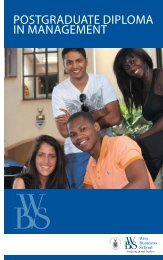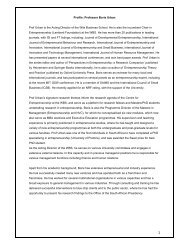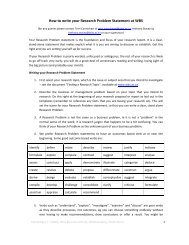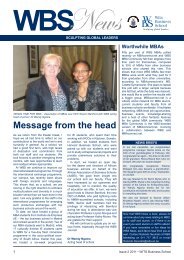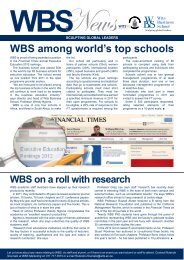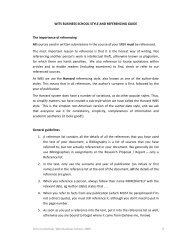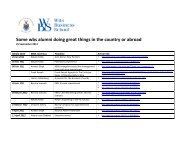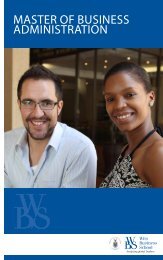WBS Newsletter Issue 7 2011 - Wits Business School
WBS Newsletter Issue 7 2011 - Wits Business School
WBS Newsletter Issue 7 2011 - Wits Business School
Create successful ePaper yourself
Turn your PDF publications into a flip-book with our unique Google optimized e-Paper software.
<strong>WBS</strong>News<br />
SCULPTING GLOBAL LEADERS<br />
Best wishes from <strong>WBS</strong> head of school<br />
Professor Wendy Ngoma, Head of <strong>School</strong><br />
<strong>WBS</strong> professor speaks at COP17<br />
<strong>Wits</strong> <strong>Business</strong> <strong>School</strong>’s Professor Gillian<br />
Marcelle was selected as a panellist at<br />
the Design for Sustainability Conference,<br />
which was organised in conjunction<br />
with the 17th Conference of the Parties<br />
(COP17) to the United Nations Framework<br />
Convention on Climate Change in Durban.<br />
To coincide with the United Nations event,<br />
the International Union of Architects held<br />
its annual conference on sustainability<br />
in the built environment to crystallise<br />
further a coherent set of climate change<br />
strategies for this environment.<br />
Marcelle’s work focuses on the role of<br />
science, technology and innovation as<br />
contributors to managing the transition to<br />
low-carbon systems in energy, transport,<br />
the built environment and production<br />
systems. She reports on innovation for<br />
sustainability, part of an ongoing teaching<br />
and research programme at <strong>WBS</strong> on<br />
strategic management of innovation. This<br />
work forms part of the research agenda of<br />
the recently launched Global Change and<br />
Sustainability Research Institute.<br />
Marcelle explains that developing<br />
solutions which better enable humanity<br />
to respond to climate and other global<br />
pressures requires technological<br />
solutions, behaviour change, regulatory<br />
frameworks and entrepreneurship in the<br />
form of champions who deliver solutions<br />
to market. She says: “The intellectual<br />
framework of innovation studies provides<br />
a systemic framework for analysing the<br />
inducing factors that encourage transition<br />
to low-carbon systems and those blocking<br />
factors that result in carbon lock-in.”<br />
The work being done by Marcelle is<br />
interdisciplinary and involves cooperation<br />
with scholars in disciplines such as<br />
anthropology, architecture and planning,<br />
international relations, political science<br />
and psychology. ■<br />
As the year draws to a close, I would like to wish<br />
you all a wonderful festive season and a successful<br />
2012. This year has been an incredible one at<br />
<strong>WBS</strong>, one in which we have stabilised and grown.<br />
We have been recognised for being a melting pot<br />
of diversity and have become a truly multicultural<br />
campus that offers educational excellence.<br />
I would like to congratulate all of you who<br />
graduated this year, and may the knowledge you<br />
have accumulated while at <strong>WBS</strong> stand you in good<br />
stead in your future career.<br />
This year we have established new relationships<br />
and built on old ones and, in each case, it has<br />
been of mutual benefit. Examples of these are<br />
with Montecasino, Vodacom and the City of<br />
Johannesburg.<br />
I look forward to the new year and all the<br />
wonderful new opportunities it will bring. I also<br />
eagerly anticipate welcoming new students to our<br />
school.<br />
I wish you all a safe and enjoyable holiday and I<br />
am excited about us all returning in 2012, refreshed<br />
and ready to tackle the challenges of the new<br />
year.<br />
Warm regards<br />
Professor Wendy Ngoma<br />
Head of <strong>School</strong><br />
Professor Gillian Marcelle represented <strong>WBS</strong> at<br />
a COP17-related conference<br />
Let us know about any news relating to <strong>WBS</strong>, its staff and alumni, or if there is an event you want alumni or staff to attend. Contact Rutendo<br />
Nxumalo at <strong>WBS</strong> Marketing on 011 717 3615 or e-mail Rutendo.Nxumalo@wits.ac.za.
PAGE 2<br />
<strong>WBS</strong> exchange programme<br />
These international exchange students spent the last few months at <strong>WBS</strong><br />
Sunny South Africa and its friendly<br />
people have crept into the hearts of the<br />
international exchange students who<br />
have spent the past few months at <strong>Wits</strong><br />
<strong>Business</strong> <strong>School</strong>.<br />
“It has been a phenomenal experience<br />
for all of us,” says Julie Tondreau, a<br />
master’s student from Louvain <strong>School</strong><br />
of Management in Belgium. “Not only<br />
from an academic point of view, but also<br />
personal. I think we have all made some<br />
good friends and learnt some valuable life<br />
lessons that will stand us in good stead<br />
as we sadly bid South Africa and <strong>WBS</strong><br />
goodbye.”<br />
Ten students from all over the world<br />
have spent several months at <strong>WBS</strong> as<br />
part of the Student Exchange Programme,<br />
NEWS ON CAMPUS<br />
• This month is a big celebration for two of our<br />
staff members, who will be getting married.<br />
Nerina Amos will be tying the knot on 23<br />
December and Hilary Beck tied the knot on<br />
the 10 December. We wish them the best of<br />
luck and much happiness!<br />
• <strong>WBS</strong> warmly welcomes Philominah<br />
Mashingaidze, who has taken up the position<br />
of executive personal assistant to director and<br />
head of school Professor Wendy Ngoma. We<br />
also welcome Tozi Zeka and Lindy Mataboge<br />
as senior programme coordinators in the<br />
academic office.<br />
• Congratulations to Mark and Charmaine<br />
Peters on the birth of their son, Ethan Bruce.<br />
• <strong>WBS</strong> congratulates the editor of the WITS<br />
<strong>Business</strong> <strong>School</strong> Journal, Peta Krost<br />
Maunder, who was chosen as Editor of the<br />
Year for business-to-business magazines<br />
at the Pica Awards.<br />
an international exchange programme in<br />
which <strong>WBS</strong> participates. Through this,<br />
<strong>WBS</strong> has a network with more than 50<br />
business schools in the world that sees<br />
students from these campuses spend a<br />
few months at <strong>WBS</strong>, while South African<br />
students head abroad.<br />
The global exchange programme is seen<br />
as a key aspect of the school’s offering,<br />
as it allows students the opportunity to<br />
gain important international exposure and<br />
perspectives on business.<br />
The international students agree that a<br />
vital element of their studies at <strong>WBS</strong> has<br />
been in the huge emphasis on practical<br />
knowledge at the school. “It is not just about<br />
academics,” says Corentin Cassiers, also<br />
a Louvain student. “The small classes<br />
<strong>Issue</strong> 7 <strong>2011</strong> • WITS <strong>Business</strong> <strong>School</strong><br />
also mean there is nowhere to hide and<br />
you have to take part in the class, sharing<br />
your opinions and ideas. It has been very<br />
good for our self-confidence.”<br />
It is this unique combination of theory<br />
and practical elements that makes <strong>WBS</strong><br />
stand out.<br />
“Most of us are full-time students<br />
who have had very little or no working<br />
experience, while at <strong>WBS</strong> most of the<br />
students have already been in the<br />
workplace at some point. Their sharing<br />
that experience with us has probably<br />
made this all worthwhile because that<br />
is not something you pick up in a purely<br />
academic environment, which is what most<br />
of the European universities offer,” says<br />
Charlotte Carmona, a marketing student<br />
from Euromed <strong>School</strong> of Management<br />
and <strong>Business</strong> in France. ■<br />
Academic Staff Development – Case<br />
Teaching Workshop<br />
World-renowned case-method expert Professor Jim Erskine, from the Richard Ivey<br />
<strong>School</strong> of <strong>Business</strong> in Canada, presented an intensive three-day workshop through<br />
the <strong>Wits</strong> <strong>Business</strong> <strong>School</strong> Case Centre at the end of October.<br />
Erskine has designed and conducted case teaching and writing courses for many<br />
corporations, universities and government agencies worldwide. The recipient of several<br />
teaching awards, he has co-authored three books on case method, and brought to<br />
the workshop a wealth of knowledge from which participants could benefit.<br />
The workshop was designed for those who are new to the use of cases for teaching,<br />
as well as those who have case teaching experience but wanted to improve their<br />
teaching effectiveness. Workshop participants came not only from <strong>WBS</strong>, but also<br />
from the <strong>Wits</strong> <strong>School</strong>s of Accountancy and Economic and <strong>Business</strong> Science, and the<br />
University of the Free State. They worked through all the steps in the case-teaching<br />
process, using exercises, group discussions and case-teaching practice sessions.<br />
Case Centre coordinator Claire Beswick remarks that the workshop was a great<br />
success and she received excellent feedback from those who attended. “The casestudy<br />
method is widely acknowledged as one of the best ways to teach business<br />
skills,” she says, “and it was good to see not only <strong>WBS</strong> delegates, but participants<br />
from the rest of the university and the broader university community too.” ■<br />
If you do not want to receive this newsletter, please reply to this e-mail with ‘unsubscribe newsletter’ in the subject line
PAGE 3<br />
Luca Gallarelli speaking about the evolution of the Carling Black Label<br />
brand<br />
From cowboy to new<br />
SA man – the Carling<br />
Black Label story<br />
<strong>Issue</strong> 7 <strong>2011</strong> • WITS <strong>Business</strong> <strong>School</strong><br />
Guest lecture series<br />
Professor Gunnigle:<br />
recession elevates HR<br />
management<br />
Many multinational companies have responded to the global<br />
financial crisis with extensive restructuring – particularly through<br />
human resources (HR) management. Professor Patrick Gunnigle<br />
focused on this in his October <strong>WBS</strong> Distinguished Lecture.<br />
Gunnigle is professor of business studies at Kemmy <strong>Business</strong><br />
<strong>School</strong> at the University of Limerick, Ireland, and used his own<br />
country as his example. His research shows that the global crisis<br />
led to changes in staffing, pay and benefits, industrial relations,<br />
and the way in which HR controls these functions in multinationals<br />
based in Ireland. The role of HR management in companies had<br />
become far more important, because it was the key department<br />
managing the response to the recession, he says.<br />
In Ireland, reckless lending by banks meant the country was<br />
severely impacted by the recession. Now, Gunnigle explains, the<br />
focus is on restructuring and cost reductions. These reductions<br />
manifest in HR changes, with short-term redundancies (lay-offs<br />
of employees), reduction of exit packages and pay cuts or freezes<br />
taking effect. HR management systems in many companies have<br />
downsized by letting staff go and by reducing training and cutting<br />
pay, Gunnigle says. In some cases, workers are let go, only to<br />
return with restructured packages that are more cost-effective<br />
for the companies. He says recession-related lay-offs – which<br />
he labels “management opportunism” – gave HR the chance to<br />
weed out poor performers, thereby benefiting the companies.<br />
Money is also saved on HR by cutting training and employing<br />
workers who already have the skills to fulfil roles in companies.<br />
Despite this, companies have maintained chain management and<br />
succession training – what Gunnigle refers to as “elite” training.<br />
Multinationals have pursued new initiatives in HR management<br />
to reduce costs as a way of coping with the recession. But while<br />
HR staff members administer these changes, they are not safe<br />
from the cuts. Installing IT-based HR management systems has<br />
become common, Gunnigle says, meaning fewer administrative<br />
staff members are needed. So, although the department’s role<br />
has become more important, there has been a slimming down of<br />
its numbers and an increased reliance on technology. ■<br />
Whether its leading characters were saving horses from creeks<br />
or building stadiums, Carling Black Label’s campaigns have<br />
always focused on masculinity. Director of Ogilvy Cape Town,<br />
Luca Gallarelli, spoke about the evolution of the Carling Black<br />
Label brand during a <strong>WBS</strong> Distinguished Lecture in November.<br />
Gallarelli says Ogilvy has worked on campaigns for more<br />
than 20 of South African Breweries’ brands during their 50-year<br />
partnership. In terms of Carling Black Label, he says, they keep<br />
reinventing the brand with the times. The Carling Black Labeldrinking<br />
man in its adverts has evolved from being represented<br />
by a cowboy to a working-class hero and then to a champion over<br />
the years.<br />
Carling Black Label launched in 1966 when South African<br />
Breweries identified an opportunity to occupy a slightly lower end<br />
of the market than the mainstream Lion Lager, Gallarelli explains.<br />
Carling Black Label drinkers were “proud and heroic” characters<br />
who deserved a reward after a hard day’s work, he says. This<br />
campaign allowed Carling Black Label to capture a significant<br />
share of the market.<br />
The cowboy character in Carling Black Label’s adverts<br />
epitomised the heroic spirit of the brand – but plummeting shares<br />
in the 1980s meant Carling Black Label had to adapt its strategy<br />
to attract a new market.<br />
Carling Black Label saw an opportunity in the rise of the trade<br />
unions in the 1980s and, by representing blue-collar workers in<br />
the adverts, successfully tapped into a new market.<br />
“The campaign gave workers a sense of pride in what they<br />
do,” says Gallarelli. “Their role was being recognised, and Carling<br />
Black Label was their reward for the hard day’s work.”<br />
In the 2000s, the characters in Carling Black Label’s adverts<br />
became workers building barriers against falling rocks on<br />
Chapman’s Peak Drive in Cape Town and, in 2009, the workers<br />
were the heroes behind the building of stadiums for the 2010<br />
FIFA World Cup.<br />
But the most recent campaign focuses on a multidimensional<br />
man. By using musicians, sportsmen, businessmen and the like,<br />
Ogilvy depicts ordinary and extraordinary men as champions,<br />
explains Gallarelli.<br />
Through developing campaigns in shebeens and bottle stores,<br />
and sponsoring events like the annual Rocking the Daisies music<br />
festival, the brand has expanded into large activation territories.<br />
Also, by focusing on “passion points” such as soccer through<br />
the Carling Black Label Cup, which gave Carling Black Labeldrinking<br />
soccer fans a chance to choose the players for teams<br />
in a highly-publicised match between Kaizer Chiefs and Orlando<br />
Pirates at FNB Stadium, Carling Black Label maintains steady<br />
occupancy in a vast market. ■ Visiting Irish professor Patrick Gunnigle speaking at <strong>WBS</strong><br />
If you do not want to receive this newsletter, please reply to this e-mail with ‘unsubscribe newsletter’ in the subject line
PAGE 4<br />
<strong>WBS</strong> 2012 short courses<br />
SENIOR EXECUTIVE PROGRAMMES<br />
<strong>WBS</strong> International Senior Executive Development<br />
Programme (Including a study tour) IEDP<br />
1 August–1 September 2012<br />
International Study Tour in Learning and Development<br />
(IEPLD)<br />
19 April–4 May 2012<br />
Corporate Governance<br />
28 May – 31 May 2012<br />
GENERAL MANAGEMENT<br />
Art and Science of Negotiation<br />
6 March – 9 March 2012<br />
28 August – 31 August 2012<br />
Managing a Turnaround in Corporate Renewal<br />
21 May – 25 May 2012<br />
Thinking and Planning Strategically<br />
13 August – 16 August 2012<br />
FINANCE<br />
Finance for Non-financial Managers<br />
14 May – 17 May 2012<br />
30 July–2 August 2012<br />
12 November – 15 November 2012<br />
20 February – 23 February 2012<br />
Technical & Financial Evaluation in Mineral Projects<br />
16 April - 20 April 2012<br />
17 September - 21 September 2012<br />
Certificate Programme in Finance and Accounting 27<br />
12 March–25 July 2012<br />
Certificate Programme in Finance and Accounting 28<br />
16 July–21 November 2012<br />
Integrated Strategy, Budgeting and Reporting Programme<br />
15 October - 17 October 2012<br />
PROJECT MANAGEMENT<br />
Project Management<br />
20 February - 24 February 2012<br />
11 June - 15 June 2012<br />
12-16 November 2012<br />
Certificate Programme in <strong>Business</strong> Project Management<br />
21 May - 14 September 2012<br />
13 August - 14 November 2012.<br />
CONTACT DETAILS:<br />
Rutendo Nxumalo<br />
Tel 011 717 3515<br />
E-mail Rutendo.Nxumalo@wits.ac.za<br />
MARKETING<br />
Product Strategy and Brand Management<br />
16 July – 18 July 2012<br />
Marketing Management Programme<br />
24 May - 26 May & 21 June - 23 June 2012<br />
Sales Management<br />
20 August – 24 August 2012<br />
Strategic Marketing Management<br />
2 July – 6 July 2012<br />
Certificate Programme in Marketing Management 18<br />
31 May – 8 September 2012<br />
Social Media That Gets Results<br />
5 June – 14 June 2012<br />
SPECIALISED TOPICS<br />
BEE – Unpacking Strategy and Codes<br />
14-15 March & 18 April 2012<br />
22-23 August & 19 September 2012<br />
Personal Effectiveness Through Emotional Intelligence<br />
7 February - 10 February 2012<br />
MANAGEMENT DEVELOPMENT PROGRAMME<br />
New Managers Programme 79<br />
12 March - 15 June 2012<br />
New Managers Programme 80<br />
21 May - 24 August 2012<br />
New Managers Programme 81<br />
3 September - 7 December 2012<br />
Management Advancement Programme 103<br />
26 January - 7 September 2012 (Part-time)<br />
Management Advancement Programme 104<br />
12 April - 17 August 2012 (Full-time).<br />
LEADERSHIP DEVELOPMENT<br />
Certificate Programme in Leadership Development<br />
13 February - 10 August 2012<br />
11 June - 9 November 2012<br />
Fast Track Leadership<br />
28 September (Pre-day), 13-20 October, 30 November<br />
(Follow-up day) 2012<br />
24 March (Pre-day), 21-28 April, 2 June (Follow-up day) 2012<br />
<strong>Business</strong> Executive Coaching Certificate<br />
15 February - 21 July 2012.<br />
<strong>Issue</strong> 7 <strong>2011</strong> • WITS <strong>Business</strong> <strong>School</strong><br />
If you do not want to receive this newsletter, please reply to this e-mail with ‘unsubscribe newsletter’ in the subject line



